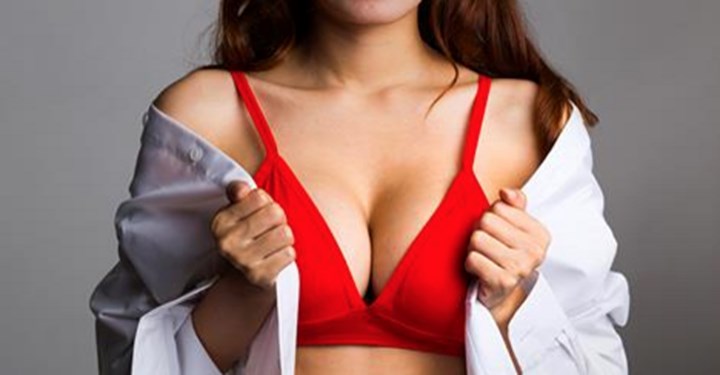
You don’t need scientific proof to tell you that men like women’s breasts, but there’s still plenty of research to back up that claim.
For example, one University of Nebraska-Lincoln study found that men spend more time ogling a woman’s chest than any other part of her body.
But quiz most guys about how much they really know about breasts and you won’t get much farther then how pleasing they are to look at.
(Unfortunately, no legit research has proven that gazing at her breasts is actually beneficial to your health.)
Learn how to better navigate second base with these fascinating facts you never learned in Anatomy 101.
Their sizes can fluctuate
You can tell when her period is with just a glance.
According to the National Institute of Health, women’s levels of the hormones progesterone and prolactin increase about a week or two before she menstruates.
This causes her to retain more water and her breast tissue and milk glands to grow, and with them, her bra size. Some women can grow as much as a cup size bigger.
But be careful: If she is about to be on her period, stimulation can be more painful and decrease sexual arousal, says Dr Leah Millheiser, at the Stanford School of Medicine.
Breast orgasms exist
Sounds too good to be true, right? Rutgers University researchers used an fMRI to find that nipple stimulation activated the medial paracentral lobule, or the part of a woman’s brain that also lights up with genital action.
Still not convinced? In a classic study of 213 women, 29 per cent of the females reported experiencing a nipple-gasm. Try this new titillating technique from Dr. Ava Cadell, a sexologist and author of NeuroLoveology, The Power to Mindful Love & Sex.
Lick and kiss every centimetre of her breasts and follow with light fingertip caresses, leaving her nipples until last.
“Cup your hand over one breast at a time so that the tip of her nipple rests in between your thumb and your index finger. Squeeze the fingers together so that you raise her nipple slightly and lick it with the tip of your tongue,” Cadell says.
To enhance her arousal, Cadell suggests keeping an ice cube in your mouth.
“Wrapping her eyes in a blindfold will heighten her sensation even more,” says Emily Morse, sexologist and host of Sex With Emily podcast.
Most importantly, be patient. While Cadell says it should hopefully take under 20 minutes, every woman is different and her response time will vary.
Don’t zero-in on the target
While you may want to use your newfound wisdom to shower your woman with nipple-gasms, remember that her entire chest is important.
The nipple is actually the least sensitive to touch, says Dr Debbie Herbenick, the Men’s Health Sex Professor and a sexual-health researcher at Indiana University’s Kinsey Institute.
Austrian researchers found after testing 150 women that the top quarter of their breasts – think between 10 and 2 on a clock – felt sensations most strongly, then the areolas – the dark area circling the nipple – and surprisingly last, the nipple itself.
Don’t focus on one area, Herbenick says. The more territory covered, the better.
One may be bigger
Don’t freak out if she appears a little lopsided: About one quarter of all women have one breast that is larger than the other, says Dr Keri Peterson, an internal medicine physician and Women’s Health medical contributor.
“Women’s breasts are independent beings that respond to oestrogen differently during puberty,” Peterson says.
For about 65 per cent of women with breast asymmetry, the left dominates. A Turkish study suggests that the left side of her body has a higher immune hypersensitivity, a factor that impacts hormones such as oestrogen that control breast shape and size.
This unevenness is only cause for concern if one breast abruptly becomes larger than the other, Peterson says.
If that’s the case, she’ll likely notice the change like you will – feeling lumps or increased tenderness, which could be signs of infection, cysts, or even breast cancer.
Help her by playing doctor
If you feel anything strange under her shirt, goad her to get a professional breast exam just to confirm that everything is normal, says Millheiser.
A majority of those scary bumps turn out to be non-cancerous masses that are caused by hormonal changes, such as a cyst, which usually feels like a soft grape, or a fibroadenoma, a rubbery moveable mass.
Women should be going in for check-ups once a year, or biyearly if she has a family history of breast cancer, says Millheiser.


















